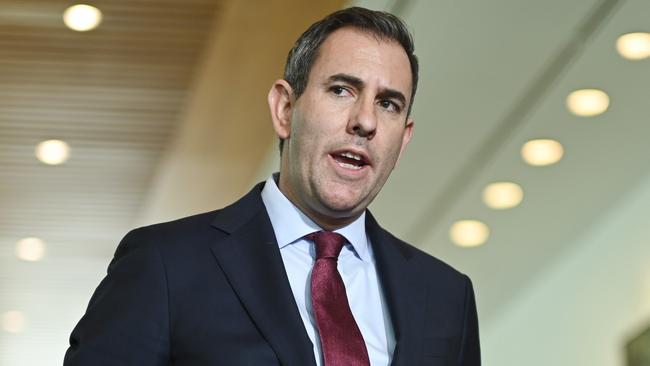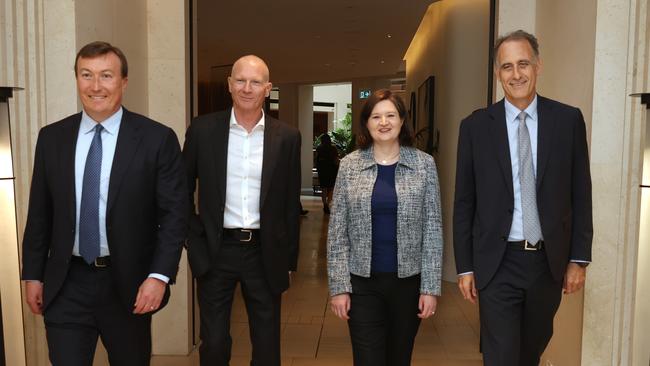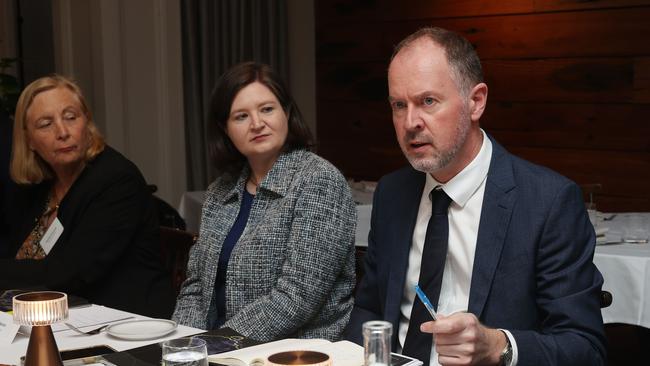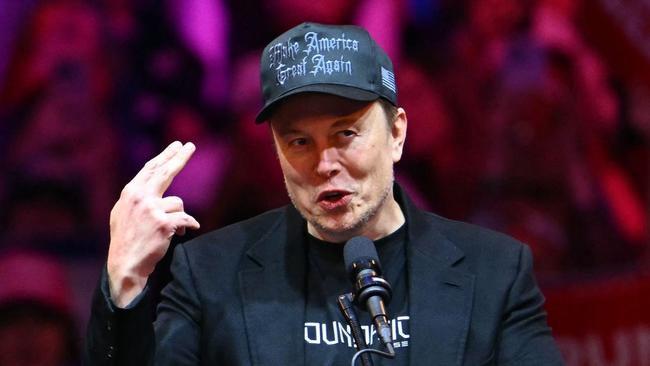‘Do no more harm’: CEOs make their election pitch
The notion of an Elon Musk-style regulation buster with authority to drive changes would be welcome relief here.

When Rob Scott was asked by The Australian to nominate a single request of politicians heading into an election year, his response was unequivocal.
“Let’s do less damage,” the Wesfarmers CEO said.
Scott, who oversees a conglomerate that counts more than 120,000 workers across brands including Bunnings, Kmart, Officeworks as well as mining and chemicals, says even by just hitting pause on volume of new regulations being loaded onto business, that would represent a major improvement on the current trajectory.
“We can talk about what the opportunities are, but we should also be mindful that there is more damage we can create with more red tape, more unnecessary taxes and so forth,” he said.
“The number one ask would be: ‘Please, let’s do less damage, less red tape and less regulation’.”

Scott was speaking at a roundtable organised by The Australian and Business Council of Australia exploring the nation’s productivity malaise.
The roundtable found that a near-decade slowdown in productivity rates represents a longer-term threat to living standards and could seriously hurt future job opportunities.
Productivity growth in the last decade was running at the slowest pace in 60 years. And Treasury recently downgraded its long-run annual productivity growth assumption to just 1.2 per cent from 1.5 per cent, a move that has a serious cascading impact across economic forecasts.
The roundtable, which also included Cochlear chief executive Dig Howitt and BP Australia country president Lucy Nation, heard of ever-increasing hurdles put in place when it comes to doing business.
Other chief executives have privately spoken to The Australian about similar frustrations.
The leaders at the roundtable were highly experienced in their own fields and operate in global markets. But they are all coming from a place of wanting to invest more into the economy, hire more skilled Australians and grow the nation’s wealth.
They can also see how global capital has choices about where to invest and there are other destinations that are becoming more appealing. Even more worrying, they say feedback from Australian investors including big industry super funds is that they are increasingly sending funds offshore where there are better returns on offer.
Things like a patchwork regimen of job-sapping state payroll and other taxes, increasing energy regulation, re-regulation of the labour market and glacial planning and approvals processes all add to the growing frustrations about the limits put on business.

Scott is putting his money where his mouth is, investing billions building out a lithium mine and a high-value processing plant. This could see the plant qualify to get a 10 per cent tax credit for the processing and refining costs from 2028, under legislation introduced into parliament on Monday.
Incoming US president Donald Trump’s move to put billionaire Elon Musk alongside Vivek Ramaswamy to head up an ambitious project to make government more efficient has not gone without notice. While no-one is advocating for the full Musk experience here, there is merit in having someone with the authority to drive meaningful reform.
“I would wholeheartedly support taking an approach of having somebody who has a remit to reduce red tape and to focus on wherever we can reasonably look at deregulation,” Howitt told the roundtable.
“We’ve seen that some jurisdictions have had approaches in the past where you might take out two regulations for every one that you put in. I don’t think they work so well, because invariably you end up with a situation where departments are just looking for easy regulations that they can strip away in order to impose, potentially, something that’s quite significant on business,”

Treasurer Jim Chalmers has put a lot of stock in the Intergenerational Report produced by Treasury every five years. And while it takes a longer-term view covering four decades, it has a narrow lens around the pressures confronting the Australian economy and the federal government’s budget given demographic changes.
The most recent report identified an ageing population, climate change, rising demand for care and support and geopolitical risks. This makes it a reactive document rather than one based around opportunity for Australia.
Chalmers meets his state counterparts on Friday with productivity malaise on the agenda. His recently outlined $900m productivity fund represents a good starting point, the CEOs said, but represents a drop in the ocean when spread across the states and territories.





To join the conversation, please log in. Don't have an account? Register
Join the conversation, you are commenting as Logout